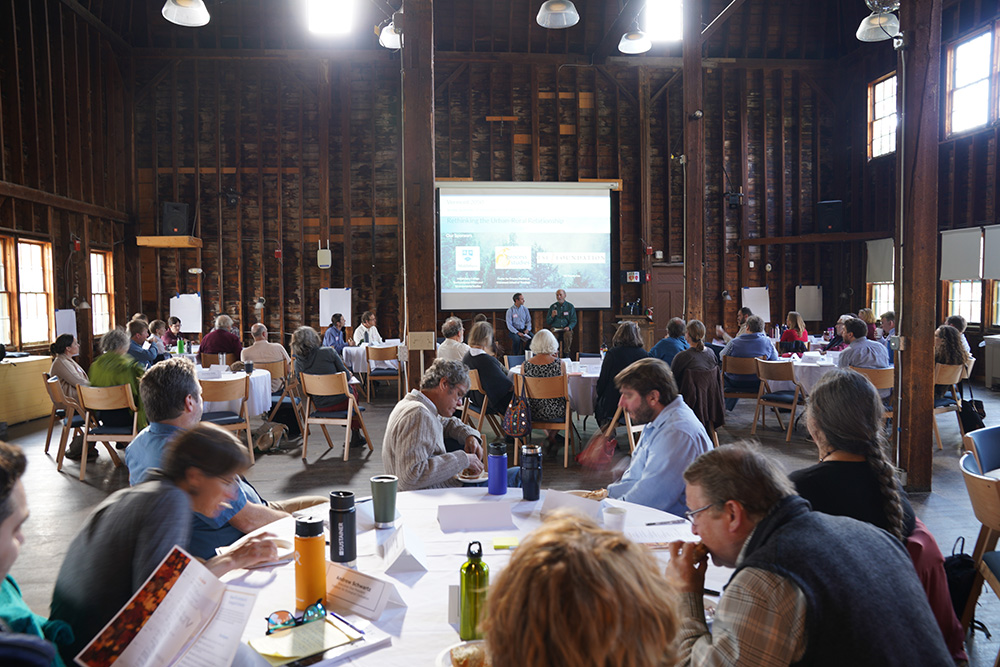Planning for Urban-Rural Wellbeing
Reimagining Human Communities

The Institute for Ecological Civilization (EcoCiv) is embarking on a multi-year effort to understand and rethink the relationship between urban population centers and rural communities. Urban and rural communities are often regarded as contraries, and climate change, as well as rapid urbanization and consumption, are rendering urban-rural relationships increasingly unsustainable. Viewing rural and urban communities not as separate entities but as parts of interconnected systems – as bioregions defined by natural boundaries rather than political borders – is a key step toward reversing this trend.
Our method involves guiding bioregional groups to create a vision for some 30 years in the future, then “backcast” from this vision to the present, and begin to draft roadmaps from today toward the longer-term vision.
Collaboration across sectors is essential for this process. EcoCiv helps different sectors identify and build on co-benefits—solutions to problems in one sector that include positive outcomes in other sectors.
This kind of long-term, connected work is holistic, aimed at improving wellbeing for those in rural communities as well as those in more densely populated urban areas. Wellbeing in this sense encompasses not only ecological sustainability, but also just economics, impactful education, and access to healthcare, the arts, community engagement, and citizen-driven governance structures.
To begin the process of bridging the urban-rural divide through the lens of a bioregional, longer-term time frame, EcoCiv has begun a multi year project on Rethinking the Urban-Rural Relationship. This program will include a series of local events in cities and towns across North America and will expand to include multi-city and eventually multi-national conversations that address the urban-rural relationship from a global perspective.
EcoCiv Urban-Rural in Vermont
September Event – Vermont 2050

From September to December 2019, EcoCiv and our partners in Vermont held three successive events to begin work toward building a statewide sustainability plan. We convened the first event at the Bread Loaf Campus of Middlebury College on September 15, and included roughly 60 cross-sector participants from around the state.
In early October 2019, EcoCiv and Lt. Governor David Zuckerman co-hosted the first follow-up event, a virtual meeting with a smaller group of Bread Loaf event participants. This meeting allowed participants to review and revise the vision summaries from the previous event, share progress that had been made since September, and helped to frame the work that would be done at the next in-person event in December.
Here you will find links to the presentations and reports from our September 15 event with the Lt. Governor of Vermont.
Planning Within a Bioregion Presentation
Vital, Resilient, Connected. A Vision for Vermont’s Working Landscape
Rethinking the Urban-Rural Relationship: Toward an Ecological Civilization
December Meeting
On December 9, EcoCiv partnered with the Lt. Governor to co-host a half-day meeting at the State House with a hand-picked group of highly skilled leaders from various sectors. During our time together, we focused on creating a framework for legislation that will empower Vermont to be more resilient in the long-term. Participants at this event honed the visions for a sustainable Vermont produced during the previous two meetings, worked together to design strategies to achieve those goals, and outlined specific actions to take in the short-run to jumpstart the process.
The ultimate goal of these events and ones that will follow is not only a vision for Vermont’s future, but also actionable steps to take toward specific outcomes—legislative and otherwise. Below is a summary of the vision categories and frameworks that emerged during the December meeting.
